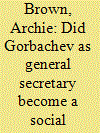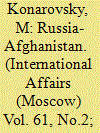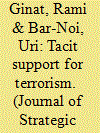| Srl | Item |
| 1 |
ID:
108004


|
|
|
| 2 |
ID:
118433


|
|
|
|
|
| Publication |
2013.
|
| Summary/Abstract |
As General Secretary, Gorbachev evolved from a Communist reformer to a socialist of the social democratic type. The most important programmatic documents of the CPSU in 1990-1991, on which Gorbachev had the predominant influence, were essentially social democratic. (Many in the Party apparatus had no intention of implementing them.) From 1988, Gorbachev was advocating fundamental change of the Soviet system, although there were zig-zags in his public pronouncements under the pressure of events. Ill-understood both at home and abroad, Gorbachev's social democratic ideas were 'outflanked' by the market fundamentalism and political impatience of his radical opponents and frustrated by the implacable enmity of conservative defenders of the vanishing Communist party-state.
|
|
|
|
|
|
|
|
|
|
|
|
|
|
|
|
| 3 |
ID:
185533


|
|
|
| 4 |
ID:
138494


|
|
|
|
|
| Summary/Abstract |
THE YEAR 2014 marked three good round figures in the nearly century-long history of the relationships between Soviet Russia/Soviet Union/Russian Federation and Afghanistan. Last spring, the 95th anniversary of the recognition by Moscow of sovereignty and independence of Afghanistan remained unnoticed; in February, veterans of the Afghan war widely celebrated the 25th anniversary of the Soviet pullout of Afghanistan, while in December we pondered once more on the decision of the Politburo of the CC CPSU to move Soviet troops into Afghanistan adopted 35 years ago. The first date belongs to a prologue of a new stage of international relations launched by the end of World War I and the 1917 October Revolution in Russia; two others belong to the epilogue of the post-World War II international developments and the beginning of the Soviet Union's disintegration.
|
|
|
|
|
|
|
|
|
|
|
|
|
|
|
|
| 5 |
ID:
079231


|
|
|
|
|
| Publication |
2007.
|
| Summary/Abstract |
This article demonstrates the inconsistent and wavering Soviet attitude towards national liberation movements in general and the Palestinian organizations in particular. Until the late 1960s, the Soviets viewed these organizations with suspicion, hesitating to engage in political dialogue with them. However, in the 1970s, political and military events in the region, as well as modifications in the Kremlin's Cold War strategies, led to a general shift towards the Middle East in Soviet foreign policy. Soviet leaders showed increased willingness to provide certain Palestinian organizations with arms with which to conduct terrorist activities against Israeli, pro-Israeli, Jewish and Western targets. The article explores the complex relations between Palestinian organizations and the USSR in the field of international terror. The study also exposes and analyzes the nature and content of Soviet-Palestinian arms dialogues and transactions. It provides clear evidence that Soviet policymakers and other luminaries were fully informed of, and sometimes directly involved in, these transactions and dialogues at the highest levels
|
|
|
|
|
|
|
|
|
|
|
|
|
|
|
|